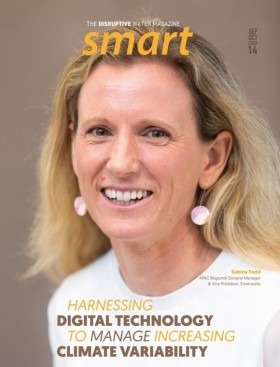"If cost of connectivity alone far exceeds the total cost of a device, the use case falls apart"

1NCE specializes in managed connectivity services for low bandwidth IoT applications such as smart metering. Their global flat rate model offers fast, secure, and reliable cellular connectivity and software services in more than 140 countries worldwide.
Water metering devices need to be able to communicate in difficult locations. 1NCE adds the simplicity of a single worldwide valid cellular fee at a fixed price, that usually serves for the entire lifetime of the device. Smart Water Magazine speaks to René Albrecht, VP Southern and Eastern Europe at this company headquartered in Germany, where it was founded in 2017, to learn more about its services for the water industry.
Can you tell us briefly about your career path and your current role at 1NCE?
Searching for the optimal digital solution, the question is which one is easiest to implement and does not entail large follow-up costs
After studying computer science, I realized that I wanted to travel the world! So, I set off for two years to work as a freelancer and visited many countries and cultures. Finally, I settled in Italy, where I have been living and working for almost 7 years now and where I had my first experience in the IoT industry. Here I got in touch with companies that created smart solutions to real-world problems. After these years of growth, I joined 1NCE two years ago. As Vice President for Southern and Eastern Europe at 1NCE, I am very fortunate to lead a highly skilled and talented team. This, together with 1NCE's offering, makes my job a fun and highly motivating challenge to expand and innovate the IoT market together with our customers with constantly new solutions and use cases.
Adopting digital solutions can be daunting for water utilities. How can they know which technologies are best suited for their specific needs?
When searching for the optimal digital solution, the first question always must be which technology is easiest to implement and does not entail large follow-up costs. Utilities have tried many technologies and either they were too expensive to implement because they were still too complicated, or they simply did not really simplify the processes.

Some of the issues utilities face as they modernize their water networks include interoperability between technologies, as well as deployment and maintenance costs. How can a cellular IoT provider help with these concerns?
Compared with many other technologies, cellular radio has one major advantage: it is already widespread, tried and tested over many years, standardized and secure. There is no need to reinvent the wheel like setting up a local network infrastructure. The only reason why mobile communications have not been in focus so far is because providers have not made a suitable offering for device communication. Cellular radio has always been something for phones. New, pure IoT-focused providers like 1NCE, are now changing that with an offering that is perfectly tailored to the needs of device communication where it is usually a matter of much lower bandwidths and data volumes, but more battery runtimes for the sensors.
Cellular radio has one major advantage: it is already widespread, tried and tested over many years, standardized and secure
How can a flat rate pricing model help manage the complexity of IoT connectivity for smart meters and other sensors?
A very important issue is the operating costs. If the cost of connectivity alone far exceeds the total cost of a device, the use case falls apart. 1NCE offers a flat rate pricing model with a one-time payment of 10 euros over 10 years. This typically covers the entire lifecycle of a device and thus costs only one euro per year for connectivity. These costs can be perfectly integrated into the overall cost of the device. No additional costs either for maintaining a network infrastructure or any other service fees will be added to the use case.

Can you comment on data security issues related to IoT connectivity?
1NCE’s pricing model typically covers the entire lifecycle of a device and costs only one euro per year for connectivity
We have built our whole network technology on licensed cellular technology. Since it is a standardized commercial radio technology, it follows the highest security standards. That is why key players like network operators, SIM manufacturers but also service providers like us need to fulfil standardized security measures. Since the introduction of SIM card technology into the GSM communication, it is a globally accepted secure element. We use only M2M Grade SIM Cards, that already are more robust on a physical level. Additionally, to that, we support a wide variety of authentication and communication protocols and applications.
At the end of the day, utilities would look to improve water system management and save on costs. Could you tell us about a successful use case of 1NCE’s digital solutions in the water sector?
One of our customers is Poland-based company Plum. With 30 years of experience, the company is specialized in the design and manufacture of Electronic Volume Correctors, Flow Computers and Data Loggers that meet international standards. With their devices, they enable cost-effective management of energy, gas, or water consumption by customized smart-metering solutions. Their solution has recently been installed for a large water distribution company in Croatia that needed an automated billing solution as well as a real-time monitoring system to detect system anomalies more quickly.


